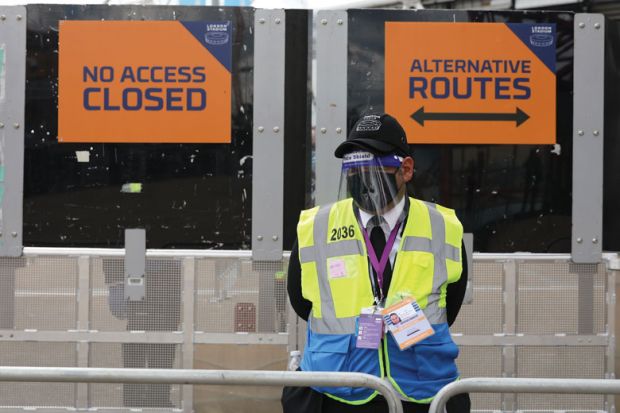The University of London’s School of Advanced Study (SAS) is set to close two of its renowned institutes as part of a pandemic-related restructure.
Jo Fox, interim dean of the SAS and director of its Institute of Historical Research (IHR), told Times Higher Education that the institution was consulting with staff over proposals to close the Institute of Commonwealth Studies and the Institute of Latin American Studies in a bid to save £1.5 million.
The school’s seven other institutes will remain and the institution is planning to establish two new centres focused on the digital and experimental humanities, as well as a new doctoral centre.
Professor Fox said that the institution’s new strategy was aimed at positioning the SAS as a “national platform for thinking collectively about public engagement across the humanities” and ensuring that the humanities is “at the forefront of the research agenda”.
Twenty-six staff are in posts that are at risk, but half of those will be moved to new roles. Three of the proposed job losses are academic positions.
Professor Fox said that the SAS had been “hit with the financial challenges of Covid” and was very dependent on income from events, which had been running for free online since the start of the pandemic.
She said that refugee law, human rights and environmental justice research projects at the two institutes earmarked for closure would be moved to the Institute of Advanced Legal Studies, while the study of black British history, currently with the Institute of Commonwealth Studies, would move to the IHR.
These topics “don’t just exist in the Commonwealth and we want our researchers to be flexible to move their research exactly where the global challenges are”, she said.
Professor Fox added that the Latin American institute was “very small” and “we think that Latin American studies as a discipline would be better served by a more extensive and securely funded operation”.
The new institutional strategy also includes providing additional support to early career researchers and PhD students. Professor Fox said that once the institution was financially sustainable, all junior researchers will be in permanent and stable academic posts, citing concerns over the best young scholars leaving the sector due to the lack of stability.
Linda Newson, director of the Institute of Latin American Studies, said the institute has been the flagship for the field since it was founded in 1965 and “the closure would be a disaster for Latin American studies”.
“It sends a very bad signal at a time when universities and the UK are moving into a post-Brexit world where we need sound knowledge of regions, particularly in the Global South,” she said, adding that it would also hamper the sector’s diversity and inclusivity agenda.
A source with close links to the Institute of Commonwealth Studies, who asked not to be named, said the IHR has “only recently moved into [research on] black British history and has no particular expertise in that area”, while the Institute of Commonwealth Studies has “networks developed over decades” that cannot be replicated.
“It is extraordinary in the current climate, going into Brexit, that the SAS is closing down its two regional studies centres which have extraordinarily strong links with the Global South,” they said.
Another SAS staff member said that the University of London has “a poor record on diversity” and the closures will mean that activities of “crucial importance to national and international conversations about race, colonialism and the legacies of empire will be significantly weakened at a national level”.
Register to continue
Why register?
- Registration is free and only takes a moment
- Once registered, you can read 3 articles a month
- Sign up for our newsletter
Subscribe
Or subscribe for unlimited access to:
- Unlimited access to news, views, insights & reviews
- Digital editions
- Digital access to THE’s university and college rankings analysis
Already registered or a current subscriber? Login








